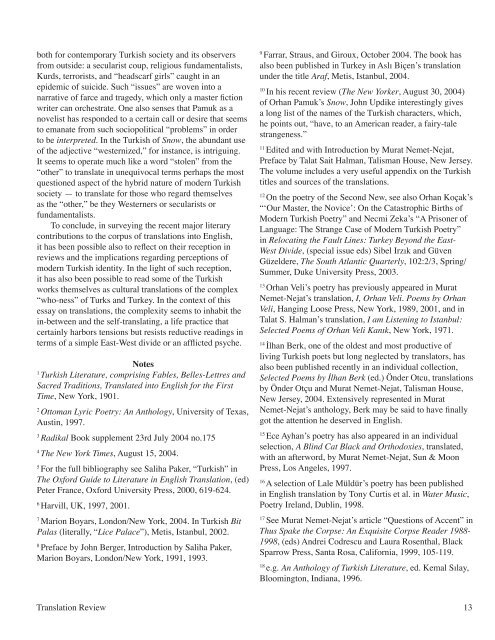Translation Review - The University of Texas at Dallas
Translation Review - The University of Texas at Dallas
Translation Review - The University of Texas at Dallas
Create successful ePaper yourself
Turn your PDF publications into a flip-book with our unique Google optimized e-Paper software.
oth for contemporary Turkish society and its observers<br />
from outside: a secularist coup, religious fundamentalists,<br />
Kurds, terrorists, and “headscarf girls” caught in an<br />
epidemic <strong>of</strong> suicide. Such “issues” are woven into a<br />
narr<strong>at</strong>ive <strong>of</strong> farce and tragedy, which only a master fi ction<br />
writer can orchestr<strong>at</strong>e. One also senses th<strong>at</strong> Pamuk as a<br />
novelist has responded to a certain call or desire th<strong>at</strong> seems<br />
to eman<strong>at</strong>e from such sociopolitical “problems” in order<br />
to be interpreted. In the Turkish <strong>of</strong> Snow, the abundant use<br />
<strong>of</strong> the adjective “westernized,” for instance, is intriguing.<br />
It seems to oper<strong>at</strong>e much like a word “stolen” from the<br />
“other” to transl<strong>at</strong>e in unequivocal terms perhaps the most<br />
questioned aspect <strong>of</strong> the hybrid n<strong>at</strong>ure <strong>of</strong> modern Turkish<br />
society — to transl<strong>at</strong>e for those who regard themselves<br />
as the “other,” be they Westerners or secularists or<br />
fundamentalists.<br />
To conclude, in surveying the recent major literary<br />
contributions to the corpus <strong>of</strong> transl<strong>at</strong>ions into English,<br />
it has been possible also to refl ect on their reception in<br />
reviews and the implic<strong>at</strong>ions regarding perceptions <strong>of</strong><br />
modern Turkish identity. In the light <strong>of</strong> such reception,<br />
it has also been possible to read some <strong>of</strong> the Turkish<br />
works themselves as cultural transl<strong>at</strong>ions <strong>of</strong> the complex<br />
“who-ness” <strong>of</strong> Turks and Turkey. In the context <strong>of</strong> this<br />
essay on transl<strong>at</strong>ions, the complexity seems to inhabit the<br />
in-between and the self-transl<strong>at</strong>ing, a life practice th<strong>at</strong><br />
certainly harbors tensions but resists reductive readings in<br />
terms <strong>of</strong> a simple East-West divide or an affl icted psyche.<br />
Notes<br />
1 Turkish Liter<strong>at</strong>ure, comprising Fables, Belles-Lettres and<br />
Sacred Traditions, Transl<strong>at</strong>ed into English for the First<br />
Time, New York, 1901.<br />
2 Ottoman Lyric Poetry: An Anthology, <strong>University</strong> <strong>of</strong> <strong>Texas</strong>,<br />
Austin, 1997.<br />
3 Radikal Book supplement 23rd July 2004 no.175<br />
4 <strong>The</strong> New York Times, August 15, 2004.<br />
5 For the full bibliography see Saliha Paker, “Turkish” in<br />
<strong>The</strong> Oxford Guide to Liter<strong>at</strong>ure in English <strong>Transl<strong>at</strong>ion</strong>, (ed)<br />
Peter France, Oxford <strong>University</strong> Press, 2000, 619-624.<br />
6 Harvill, UK, 1997, 2001.<br />
7 Marion Boyars, London/New York, 2004. In Turkish Bit<br />
Palas (literally, “Lice Palace”), Metis, Istanbul, 2002.<br />
8 Preface by John Berger, Introduction by Saliha Paker,<br />
Marion Boyars, London/New York, 1991, 1993.<br />
9 Farrar, Straus, and Giroux, October 2004. <strong>The</strong> book has<br />
also been published in Turkey in Aslı Biçenʼs transl<strong>at</strong>ion<br />
under the title Araf, Metis, Istanbul, 2004.<br />
10 In his recent review (<strong>The</strong> New Yorker, August 30, 2004)<br />
<strong>of</strong> Orhan Pamukʼs Snow, John Updike interestingly gives<br />
a long list <strong>of</strong> the names <strong>of</strong> the Turkish characters, which,<br />
he points out, “have, to an American reader, a fairy-tale<br />
strangeness.”<br />
11 Edited and with Introduction by Mur<strong>at</strong> Nemet-Nej<strong>at</strong>,<br />
Preface by Tal<strong>at</strong> Sait Halman, Talisman House, New Jersey.<br />
<strong>The</strong> volume includes a very useful appendix on the Turkish<br />
titles and sources <strong>of</strong> the transl<strong>at</strong>ions.<br />
12 On the poetry <strong>of</strong> the Second New, see also Orhan Koçakʼs<br />
“ʻOur Master, the Noviceʼ: On the C<strong>at</strong>astrophic Births <strong>of</strong><br />
Modern Turkish Poetry” and Necmi Zekaʼs “A Prisoner <strong>of</strong><br />
Language: <strong>The</strong> Strange Case <strong>of</strong> Modern Turkish Poetry”<br />
in Reloc<strong>at</strong>ing the Fault Lines: Turkey Beyond the East-<br />
West Divide, (special issue eds) Sibel Irzık and Güven<br />
Güzeldere, <strong>The</strong> South Atlantic Quarterly, 102:2/3, Spring/<br />
Summer, Duke <strong>University</strong> Press, 2003.<br />
13 Orhan Veliʼs poetry has previously appeared in Mur<strong>at</strong><br />
Nemet-Nej<strong>at</strong>ʼs transl<strong>at</strong>ion, I, Orhan Veli. Poems by Orhan<br />
Veli, Hanging Loose Press, New York, 1989, 2001, and in<br />
Tal<strong>at</strong> S. Halmanʼs transl<strong>at</strong>ion, I am Listening to Istanbul:<br />
Selected Poems <strong>of</strong> Orhan Veli Kanık, New York, 1971.<br />
14 İlhan Berk, one <strong>of</strong> the oldest and most productive <strong>of</strong><br />
living Turkish poets but long neglected by transl<strong>at</strong>ors, has<br />
also been published recently in an individual collection,<br />
Selected Poems by İlhan Berk (ed.) Önder Otcu, transl<strong>at</strong>ions<br />
by Önder Otçu and Mur<strong>at</strong> Nemet-Nej<strong>at</strong>, Talisman House,<br />
New Jersey, 2004. Extensively represented in Mur<strong>at</strong><br />
Nemet-Nej<strong>at</strong>ʼs anthology, Berk may be said to have fi nally<br />
got the <strong>at</strong>tention he deserved in English.<br />
15 Ece Ayhanʼs poetry has also appeared in an individual<br />
selection, A Blind C<strong>at</strong> Black and Orthodoxies, transl<strong>at</strong>ed,<br />
with an afterword, by Mur<strong>at</strong> Nemet-Nej<strong>at</strong>, Sun & Moon<br />
Press, Los Angeles, 1997.<br />
16 A selection <strong>of</strong> Lale Müldürʼs poetry has been published<br />
in English transl<strong>at</strong>ion by Tony Curtis et al. in W<strong>at</strong>er Music,<br />
Poetry Ireland, Dublin, 1998.<br />
17 See Mur<strong>at</strong> Nemet-Nej<strong>at</strong>ʼs article “Questions <strong>of</strong> Accent” in<br />
Thus Spake the Corpse: An Exquisite Corpse Reader 1988-<br />
1998, (eds) Andrei Codrescu and Laura Rosenthal, Black<br />
Sparrow Press, Santa Rosa, California, 1999, 105-119.<br />
18 e.g. An Anthology <strong>of</strong> Turkish Liter<strong>at</strong>ure, ed. Kemal Sılay,<br />
Bloomington, Indiana, 1996.<br />
<strong>Transl<strong>at</strong>ion</strong> <strong>Review</strong> 13

















